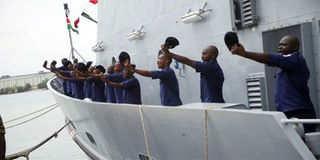Maritime security: Kenya pitches joint effort with Indian Ocean neighbours

The Kenya Coast Guards officers salute President Uhuru Kenyatta after he launched their patrol vessel Mv.Doria at Liwatoni jetty on 19 Nov 2018.
Kenya is joining other countries sharing the Indian Ocean in pushing for what it calls fair trade, as a long-term solution to piracy and other organised crime on the high seas.
The proposal came out of an open debate at the United Nations Security Council this week, chaired by India, in the first-ever session focusing on maritime security as a whole.
The Council unanimously adopted a Presidential Statement on maritime security, the first in history, reaffirming that usage of seas must be based on international law, with priority given to the 1982 UN Law of the Sea, now dubbed the “maritime constitution”.
And President Uhuru Kenyatta, who addressed the session on Monday, suggested that sea piracy in parts of Africa’s coasts may be a global problem that needs everyone’s hand to solve.
Part of the problem, he argued, is that poorer countries like those in Africa have no equipment to guard their waters, allowing competing global powers to loot, pollute or fuel proxy conflicts.
“We need a strengthened emphasis on observing international law and resisting the allure of promoting proxy rivalries in pursuit of narrow interests,” he said.
National coast guards
“International cooperation should prioritise equipping and training effective national coast guards. A properly contextualised regional and sub-regional approach is the way to go.”
Kenya has in the past been stung by piracy in waters off the coast of Somalia. A key route for imports, piracy was costing the country some $300 million a year in insurance costs before a combined battle of countries on the east and western rims of the Indian Ocean, and other global powers, helped reduce the incidents from more than 450 a year in 2010 to just one attempted incident last month.
Yet the solution is not over as pirates have simply shifted base or linked up with other criminal organisations like terrorists or poachers who are often armed or financed through the same means.
Indian Prime Minister Narendra Modi, who chaired the Monday session, said the world must focus on “common” values on the seas, arguing pirates to poachers remain major threats.
“We need a framework for mutual understanding and cooperation in order to conserve and utilise our shared maritime heritage,” he argued.
His country has about 7,600km of coastline and he argued there is a thin line between guarding the seas and providing new hurdles to legitimate trade. Both could hurt the global economy but an open and inclusive ethos, he said, could be a solution.
India proposed what it called “Security and Growth for All in the Region”, a framework similar to one launched in 2015, where countries can cooperate on maritime security such as in training or joint operations as well as keeping security in the Indian Ocean.
This was the first time the UN Security Council was handling maritime security. The session saw virtual attendance by President Kenyatta, Russian President Vladimir Putin, US Secretary of State Antony Blinken, Vietnam Prime Minister Pham Minh Chinh and French Foreign Minister Jean-Yves Le Drian.
Called “Enhancing Maritime Security: A Case for International Cooperation”, it also marked the first crucial session led by India, which is the president of the 15-member Council for August. Like Kenya, India is serving on the Council on a non-permanent basis until December 2022.
Though the Law of the Sea has been in use since 1994, fresh challenges on marine resources have seen new disputes on borders, exploitation of fish and other resources as well as the emergence of organised crime.
The statement issued after the session said pirates, human smugglers, drug traffickers, armed robbers and terrorists have combined to endanger the existence of humans and the global economies by targeting vessels, skilled personnel or installations meant for the safety of navigation.
Loss of life
“The Security Council notes the deplorable loss of life and adverse impact on international trade, energy security and the global economy resulting from such activities and, in this regard, emphasises the importance of safeguarding the legitimate uses of the oceans and the lives of people at sea, as well as the livelihoods and security of coastal communities,” the Council said.
“The Security Council further encourages Member States to designate the authority, or, where necessary, authorities to receive and respond to requests for assistance, for confirmation of nationality, and for authorisation to take appropriate measures in accordance with these conventions.”
There are other benefits of cooperation on the use of seas, according to Asoke Mukerji, a former Indian permanent representative to the UN. Citing lessons from the 2004 tsunami that hit the shores of southeast countries, he argued that countries can learn to share information on imminent disasters at sea.
After the tsunami, countries created the Indian Ocean Tsunami Warning and Migration System, which has been operating for 15 years.
“Faced with the increased threat from piracy originating off the coast of Somalia since 2007 to shipping in the western Indian Ocean, the Indian Navy participated robustly as part of a UNSC mandated 60-country Contact Group on Piracy off the coast of Somalia,” he argued on Tuesday.




